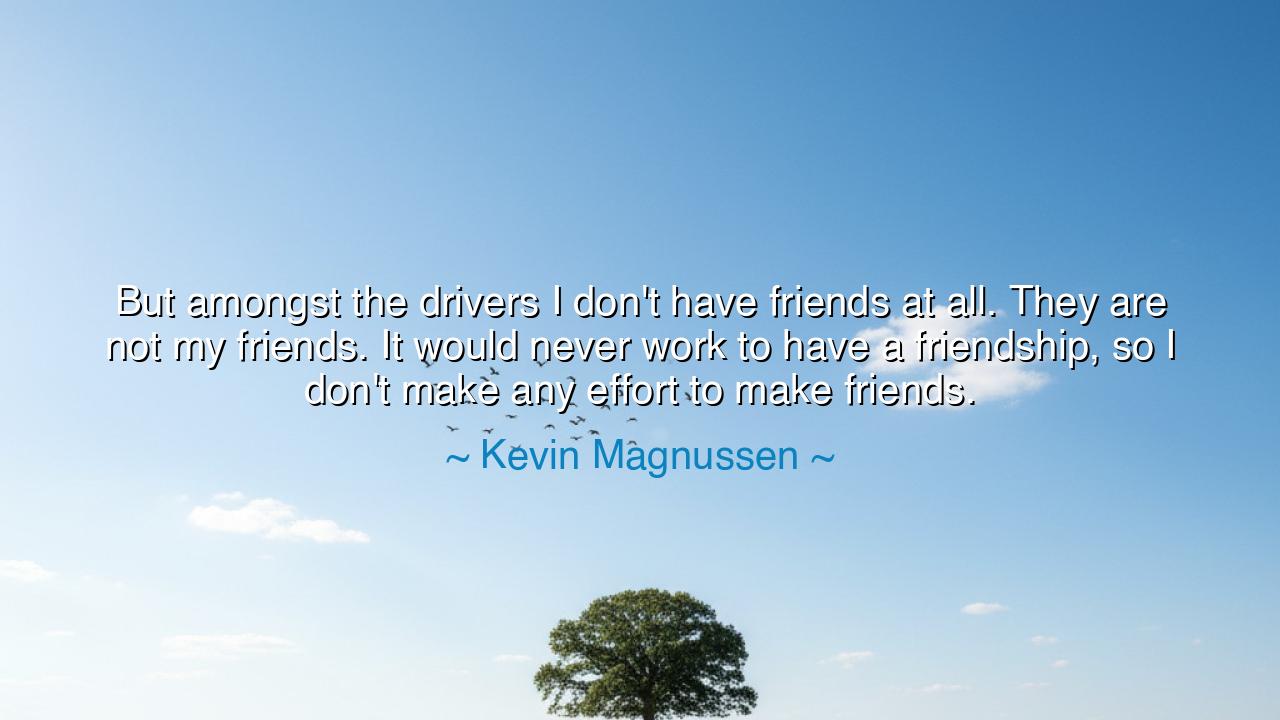
But amongst the drivers I don't have friends at all. They are not
But amongst the drivers I don't have friends at all. They are not my friends. It would never work to have a friendship, so I don't make any effort to make friends.






In the fiercely competitive world of professional sports, where every decision can tip the balance between victory and defeat, the lines between camaraderie and rivalry are often blurred. The words of Kevin Magnussen, "But amongst the drivers I don't have friends at all. They are not my friends. It would never work to have a friendship, so I don't make any effort to make friends," illuminate the complex nature of relationships in high-stakes environments. Magnussen, a driver whose profession demands a sharp focus on personal success, acknowledges that in a world governed by competition, friendships with rivals are often not only impractical but also counterproductive. The very nature of their profession requires a level of detachment, for the pursuit of victory in a race can often conflict with the emotional ties that friendship entails.
In the ancient world, the concept of competition and rivalry was deeply intertwined with the notion of honor and virtue. The Greek Olympics were not merely a celebration of athleticism but of the human spirit’s struggle for excellence. Athletes trained and competed with the knowledge that they were challenging themselves, not only against their opponents but against their own limitations. In this context, the Greeks understood that rivalries could fuel the pursuit of greatness, yet they also recognized that such rivalries could never fully transcend into friendship, for the drive to win would always require a singular focus. Magnussen’s words resonate with this understanding: in the world of high-level competition, the individual must sometimes sacrifice the bonds of friendship to maintain the mental clarity and emotional distance required for success.
Aristotle, the great philosopher, spoke of friendship as one of the highest virtues, but he also understood that it was not always possible for people to be both friends and rivals. In his Nicomachean Ethics, he wrote about three types of friendships: those based on utility, those based on pleasure, and the highest form—friendships of virtue, where individuals seek the good in each other. However, Aristotle acknowledged that the nature of these friendships could be compromised when rivals shared the same goals. Magnussen's statement reflects this dynamic—friendship and competition do not always coexist, especially when rivalry pushes one toward a singular pursuit of personal excellence, something that cannot be diluted by the emotional complexity of a friendship.
The Roman philosopher Cicero also explored the concept of friendship in his work De Amicitia ("On Friendship"). Cicero argued that true friendship is built on mutual respect, shared virtues, and the commitment to the good of both individuals. Yet, he too recognized that in the pursuit of personal goals, especially those rooted in ambition, it could be difficult to maintain deep friendships. In the world of sports, where the margin for error is often razor-thin, friendships can be a distraction that pulls individuals away from their ultimate goal. Magnussen’s perspective aligns with this wisdom: in a world where every race could decide the course of a career, the emotional entanglements of friendship could serve as a hindrance rather than a source of strength.
There is also the story of Alexander the Great and his relationship with his men, especially his companion Hephaestion. Though their friendship was one of the closest in history, Alexander, in his conquests, maintained a fierce rivalry with others—whether with other kings or with generals. His success on the battlefield was not just due to his military prowess, but his ability to detach emotionally from the conflicts with those who stood against him. Alexander could maintain close bonds with Hephaestion while engaging in brutal rivalries with others. The lesson here is that greatness often requires the ability to separate personal loyalty from professional ambition, as Alexander did, understanding that his focus on conquest required him to navigate complex emotions without letting them cloud his judgment.
The deeper lesson in Magnussen’s words is a powerful one for anyone pursuing a path where competition and individual excellence are paramount: sometimes, the pursuit of greatness demands a singular focus, which may come at the cost of friendship with those you compete against. The emotional complexities of rivalry can complicate the clarity of purpose needed to succeed. While friendship is undoubtedly one of life’s greatest treasures, there are moments when it must be set aside for a higher purpose. Magnussen’s decision to not engage in friendships with his rivals is a conscious choice to maintain the mental clarity and emotional resilience needed to perform at the highest level.
In your own life, you may find yourself in situations where your goals and ambitions require you to step back from emotional entanglements that might blur your focus. The key is to recognize when it is necessary to prioritize your own growth and success over the complexities of social relationships. While friendship remains a cornerstone of human experience, there are times when rivalry must be embraced as a motivator to push us to new heights. Let us not see this as a rejection of friendship, but as an understanding that sometimes, to excel in the pursuit of greatness, we must walk a path that is solitary, driven not by the support of others but by our own unwavering determination and clarity of purpose.






AAdministratorAdministrator
Welcome, honored guests. Please leave a comment, we will respond soon